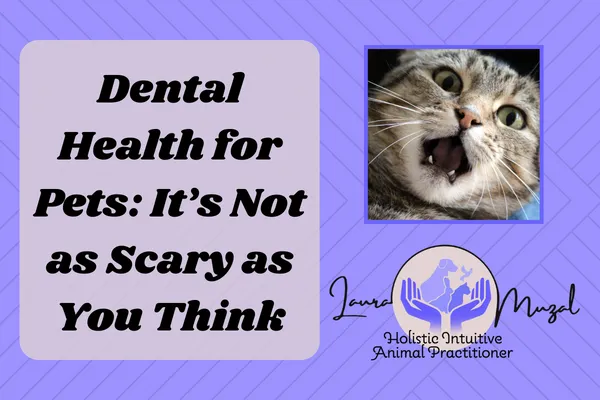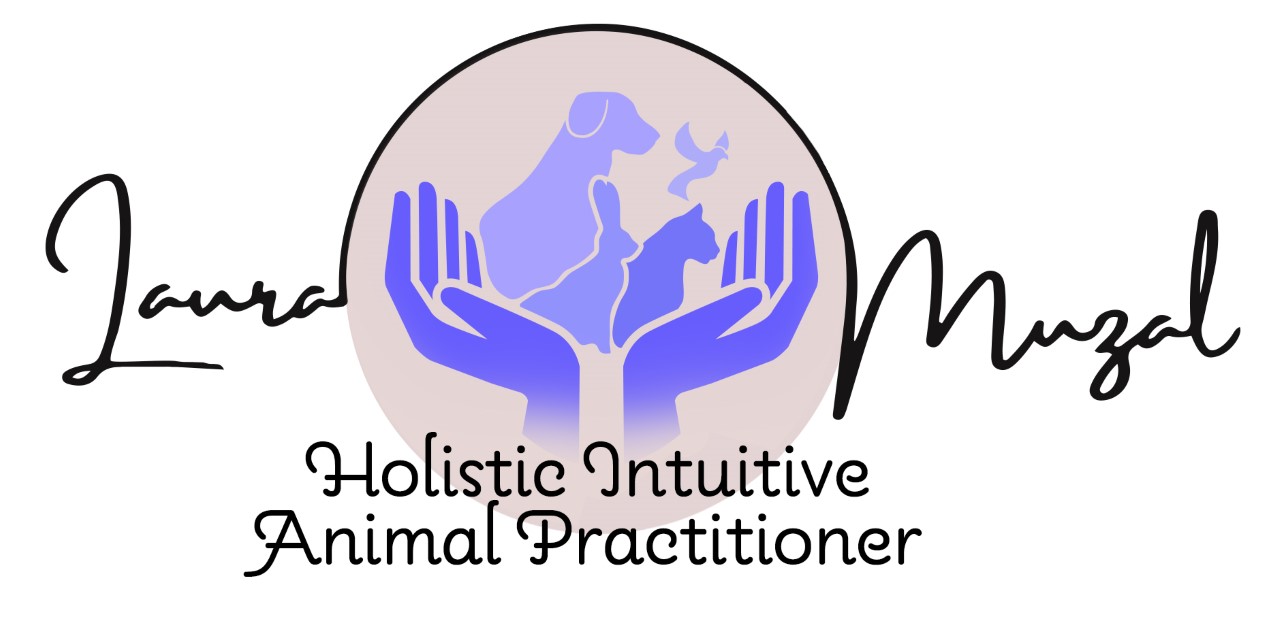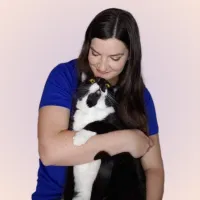Pawsitively Holistic: Your Guide to Pet Wellness

Dental Health for Pets: It's Not as Scary as You Might Think

Dental Health for Pets: It's Not as Scary as You Might Think
The phrase "dental health" can evoke fear, even in the bravest pet parents. The idea of maintaining your pet's teeth might sound intimidating, often conjuring images of anesthesia or challenging toothbrush battles. The good news is, ensuring your pet's dental well-being doesn't have to be a tough ordeal; however, it should be a primary focus in your pet's preventive care routine.
Why is Dental Health Important for Your Pets?
You spend a lot of time up close and personal with your pet, so the last thing you want is a mouth full of smelly, slimy teeth! While bad breath is certainly unpleasant, it often signals a deeper issue. The culprit behind foul breath is typically bacteria and infection in the mouth. Whether it's a decaying tooth, a dead tooth, or simply unhealthy gums, it results in an abundance of bacteria throughout the mouth. This not only causes discomfort for your pet but can also lead to challenges in chewing and eating, along with inflammation and infection spreading throughout the body.
Your Pet's Dental Health Directly Influences Their Overall Health.
It often surprises pet owners to discover the direct impact of their pet's dental health on their overall well-being. The heart pumps blood throughout the entire body at an impressive rate, meaning that the blood passing through your pet's mouth also courses through their internal organs.
When your pet's gums harbor infection, the bacteria can swiftly spread to the rest of the body, including vital organs. Many cases of heart and kidney disease may originate from dental issues that have extended.
Bacterial infection is notorious for causing inflammation, which can rapidly spread to affect joints, the gut, skin, or vital organs. Therefore, if your pet is grappling with arthritis or skin allergies, examining their dental condition might reveal insights into these health concerns.
What measures can I take to maintain my pet's oral health?
Routine
Just as proactive care is key to preventing overall health issues, addressing dental health requires effective preventive measures. Establish a dental care routine for your pet early in their life. Begin by combining baking soda with bacon grease or another oil, gently rubbing it over your pet's gums and teeth with your finger. This helps them acclimate to brushing and oral care. Gradually transition to a finger brush, and consider trying enzymatic toothpaste designed for pets (paying close attention to ingredients, especially if your pet has allergies).
Ensure your vet conducts regular examinations of your pet's mouth and teeth, and schedule professional teeth cleanings periodically as advised by your vet. They will guide you on the appropriate timing for these cleanings (Tip: February is National Pet Dental Health Month and vet clinics often have discounts on dental care during this time).
Diet
When pet parents embark on home cooking with The Original CrockPet Diet, some express concerns about the soft food's impact on their pet's dental hygiene. In reality, it proves more effective in maintaining clean teeth compared to many "crunchy" alternatives. While raw foods encourage dental health, they can result in significant gastrointestinal issues and worsen overall health problems.
Contrary to popular belief, most pets don't actually chew kibble. Many simply swallow the kibbles without chewing, offering no benefits to their teeth. Dry food also removes saliva and moisture from the mouth, fostering bacterial growth.

The Original CrockPet Diet encourages pets to chew their food because they genuinely enjoy it. This added flavor bonus stimulates saliva production, aiding in the reduction and removal of bacteria. Increased mouth moisture, coupled with better overall hydration, contributes to cleaner and healthier teeth.
Incorporating this powder into your dog's daily diet is an easy and effective way to enhance their dental health. Packed with natural ingredients, it combats harmful bacteria and removes plaque, promoting cleaner teeth and healthier gums.

If you're more of a cat person, this powder is a great addition to your cat's daily routine – a dental supplement fighting tartar and harmful bacteria, ensuring fresh breath and maintaining healthy teeth and gums. This natural supplement contains active agents, including sea algae, to soften and eliminate existing tartar while preventing future buildup. Enhanced with parsley, it not only freshens breath but also combats oral bacteria, reducing plaque and inflammation in the gums.
Treats

My preferred teeth-cleaning "treats" are these chews crafted from natural and safe ingredients, they are not only effective but also naturally break down in your pet's stomach, eliminating the risk of GI obstruction—a common concern with some teeth-cleaning treats.
For finicky eaters or those seeking a fresh alternative, raid your fridge! Crunchy fruits and veggies like carrots, broccoli stems, celery, and apples serve as excellent treats. Their crisp texture aids in cleaning plaque from your pet’s teeth as they chew.
A good bone is another option to promote dental health in your pup. Ensure it's a type that won't splinter; beef bones and deer antlers are safe choices. Steer clear of pork or poultry bones, as they can splinter and cause severe damage to your dog’s GI tract. If your pet is older, exercise caution with bones, as an exuberant pup with soft or aged teeth can easily suffer a fractured tooth. And remember to only offer raw, uncooked bones.
What if My Pet Already Has Dental Disease?
If Your Pet Is Healthy...
If you've been a bit behind in prioritizing your pet's dental health, but your dog or cat is still in their youthful stage, you're in luck. Opting for a professional dental cleaning conducted by a skilled veterinarian and a dedicated team of technicians is the best approach to restore your pet's oral health. Your vet will meticulously clean and polish all of your pet's teeth, addressing any infected or broken teeth to prevent future issues. This process involves the removal of infected teeth and thorough flushing of the sockets, eradicating the source of infection from your pet's mouth.
When selecting a veterinarian for the dental cleaning, pay close attention to crucial elements:
Anesthesia:
This is a big one, and something your vet should pay VERY close attention to. Ensure your vet employs safe anesthesia methods. Sevoflurane gas, coupled with a sedation method like IV propofol, is one of the safest anesthesia approach for pets, making for a smoother recovery.
Your vet should have a competent team of technicians involved in the procedure. One technician should be dedicated to constant anesthesia monitoring, carefully observing and recording your pet's vitals throughout, ensuring they respond well and require no adjustments. Another technician will assist in scaling and polishing teeth, aiding in tooth removal (if necessary), and ensuring proper cleaning and flushing.
It truly takes a dedicated team to complete a dental cleaning properly. So, be sure to ask your vet about these specifics. If they only have one tech (or none at all) helping with the procedure, proceed with caution (or not at all). You might want to ask for more details, or find a vet with a larger team that can be more attentive. Anesthesia is not something to take lightly.
IV Catheters:
Administering an intravenous catheter before surgery is actually a good thing. This enables your vet's team to safely administer necessary medications before, during, or after the procedure. IV sedation before anesthesia, using a drug like propofol, offers a safe, stress-free, and effective starting point. Throughout the cleaning, your vet may administer antibiotics and/or fluids to prevent infection and dehydration, setting your pet on the path to recovery even before waking up.
Pain Control:
A dental cleaning is no walk in the park for a dog or cat (that’s one of the reasons they really must be sedated for it). Your vet will thoroughly clean every surface of each tooth, including areas around and under the gumline. In cases of extractions, your pet may experience significant discomfort.
While the dental cleaning is crucial for your pet's health, your vet may provide pain medication through your pet's IV and possibly send some home for continued relief during the healing process. Consider post-surgical acupuncture, if your vet offers it, as it can significantly improve your pet's level of pain or discomfort.
If Your Pet Is Elderly or Has Health Issues...
Navigating anesthesia for pets, especially those who are unwell or elderly, can be a daunting prospect. Putting an older or sick animal under anesthesia is a scenario both you and your vet would prefer to avoid. If your pet isn't deemed healthy enough for a professional cleaning, exploring alternative approaches becomes imperative to alleviate their oral discomfort.
In cases where infection and pain hinder your pet's ability to eat or chew, addressing dental discomfort becomes crucial. Consider adding Doggy Biome Oral Cleanse Powder or Herbsmith Cat Breath Powder to their diet for a pain-free start. Attempting to brush their teeth or applying a baking soda solution to their gums may be options if your pet permits. Another approach involves flushing your pet’s mouth with a peroxide-water solution, utilizing one part peroxide to ten parts warm water, and rinsing the area along your pet’s gumline.
Exploring cold laser therapy can also be a transformative method for relieving dental pain and inflammation. Inquire with your vet about the availability of this service or explore Vetrolaser’s hand-held cold laser for home use.
It's noteworthy that even significantly older pets can safely undergo anesthesia when done with utmost care (as outlined above). Engage in a conversation with your vet regarding this option, or feel free to reach out to me for assistance in determining whether your pet can safely undergo the procedure or if alternative options are more suitable.
Don't Shy Away From Dental Care
Maintaining your pet's dental health doesn't have to be scary; it's a manageable and essential aspect of their well-being. Initiate early and establish a daily dental routine with your pet, incorporating nutritious food and beneficial chews or supplements whenever feasible. Regular veterinary exams are crucial to discern when professional cleaning is necessary or if there are issues like a broken or infected tooth.
As with every facet of your pet’s health, prevention is the key to good dental well-being. Stay vigilant, stay informed, and don't hesitate to seek assistance when needed. Your pet will express gratitude, enjoying a healthier and happier life with a well-maintained mouth.
Related Reading:
Dental Cleaning and Anesthesia for Pets - Is it Safe?
Home Care Tips for Your Cat's Dental Health
Home Care Tips for Your Dog's Dental Health
CBD for Periodontal Disease in Dogs and Cats
Have More Questions or Need Personalized Pet Care Advice?
If you have additional questions or need personalized guidance for your beloved pet, I'm here to help. Book a call with me, and let's discuss how to best care for your furry friend. Your pet's well-being is my priority, and I'm dedicated to providing the support and expertise you need. Click here to schedule your consultation today. Together, we can ensure your pet leads a happy, healthy life.
Affiliate Disclosure: Some of the links on this blog are affiliate links. If you make a purchase through these links, the blog owner may earn a commission at no extra cost to you.

